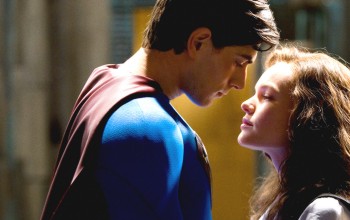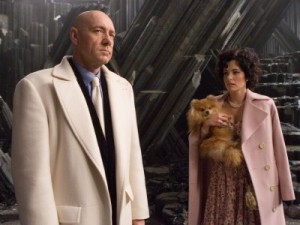|
Indeed he does, to battle for for supremacy against Batman, Spiderman, The X-Men, and all the other superhero flicks currently choking up our multiplexes. Is Superman going to get the final stranglehold? Is the most recognizable superhero ever created going to jump atop the pile and swagger about in a haughtily arrogant fashion? Well, in terms of box office, maybe, but in terms of filmmaking, it seems unlikely.  Essentially disregarding the eminently disregardable third and fourth installments in the pre-existing series of Superman flicks, Returns functions as sort of a new Superman III, and it's perfectly welcome to do so; Boa vs. Python might almost have been more welcome as a third Superman flick in preference over what was there before. Superman comes back to earth after a trip home to the remains of Krypton, where he found no one left and came home once again, only to find that Lois Lane has moved on and gotten married, and Lex Luthor has somehow wriggled his way out of prison again to launch another dastardly scheme. No one notices the gigantic coincidence regarding Superman's and Clark Kent's simultaneous disappearance and reappearance, confirming, for anyone who was still on the fence, that the co-workers of Clark Kent are the most oblivious characters ever written, and likely the worst investigative reporters to ever chase down an ambulance and stick a microphone in the face of a traumatized victim. It's been widely noted that Bryan Singer's contribution to the filmic incarnation of He Who Wears His Underwear On The Wrong Side Of His Pants is almost reverential towards the original Richard Donner films, with copious nods and references to Superman 1 and II. What's been less remarked upon is the fact that the film has a much bigger problem in being internally consistent than it does in being alike in tone to its predecessors. For starters, why, other than to signal his return to the box office, is this a film entitled Superman Returns, anyway? Why does he need to return in the context of the story? His voyage back to his homeworld occurs entirely offscreen, and his assessment of the trip is essentially, "Found nothing, came back." So why is this even in the film? Nothing that happens in the actual plot hinges on anything Superman might have done while he was gone, and the screenwriters could have easily contrived another reason for Lex Luthor to have been released from jail without relying on the hero's absence. Closely tied to this is the matter of the time frame. Aside from the fact that the trip from Krypton to Earth supposedly took hundreds or even thousands of years of real time when young Kal-el first arrived and yet only takes five years for the round trip in this film, there's the whole issue of when the hell this story is supposed to be happening. Five years after Superman II's actual release date would be 1986, when people didn't have cell phones and the Internet. Yet a look at the second film would tell you that it wasn't meant to be set in 2001, so what, I ask, the fuck is with that? And of course, there's the burning question of just how bad kryptonite really is for Superman, anyway. A mass of it that leaves him as wussy as Barry Manilow is, just minutes later, insufficient to stop him from pulling off the most patently unbelievable feat of strength ever put to film. Are we to assume that kryptonite only hurts Superman if he doesn't try really hard to ignore it? Newcomer Brandon Routh has the unenviable task of having to play Christopher Reeve playing Superman, a task which was probably 50 percent easier for Christopher Reeve, death notwithstanding. That aside, he does all right in the end; there is, after all, only just so much character depth to have to tackle, anyway. Kevin Spacey is excellent as Lex Luthor and invariably steals the show whenever he's on camera, which ends up not being quite enough to save the show entirely. His portrayal is likewise based on Hackman's version of the villain, but there the similarities stop. No effort appears to have been made in making Lois Lane look anything like the one played by Margot Kidder; in fact, she appears to have spent the "five" intervening years growing younger. Perhaps the earth is still rotating backwards following the end of the first film. The best thing I can say regarding the remainder of the cast of characters is that the writers didn't feel the need to make Lois' new guy, played by James Marsden, into some jerkwad we're supposed to hope gets killed or trounced or even kicked out of her life. He's a decent guy with a tiny but understandable bit of jealousy regarding Superman that he quickly gets over. A few other points, such as the question of Lois Lane's son, are handled well, with Luthor's (and the audience's) questions regarding his parentage being handled smartly. At other times, the film is painfully clumsy; how many close-ups of Lex's girlfriend looking conflicted do we really need to get the point? One, maybe? Yeah, I'd go with one, since the same thing already happened in the 1978 movie.  Visually, Singer's direction still shines, and the effects and action scenes are visceral and engaging. It hardly needs saying these days that the effects are well done in a technical sense, but they're also well designed. Superman's rescue of a crashing plane is a rush, and the matter of his X-ray vision is imaginatively realized. The big problem here is with the pacing; when Luthor isn't up to something nasty or Superman isn't in the middle of saving someone from some calamity, there's a general stalling sensation noticeable, especially during the final act. Singer was doubtlessly trying to inject some sense of humanity into the film as he did so well with the first two X-Men films, but let's face it, nobody worries about whether or not Superman is going to be all right in the end because he's fucking Superman-there's no "if" involved, just a matter of how long we'll have to wait before we're told that he will indeed be just fine, and just as with the beginning, it doesn't matter anyway. There's no anxious fretting about "oh dear, if he doesn't recover before that giant radioactive squid reaches the coastline, we're in so much shit." Just as with his trip home, the plot doesn't hinge upon the last act at all. Perhaps, in the end, the real problem is that Superman is sort of a dull character. He's so damned powerful that essentially no threat is beyond his ability to deter it, and he's so decent and good that there's no room for any ambiguity about his motives-I mean, do we ever think he even feels tempted to misuse his X-ray vision when looking at the girl he can never have again? When you're a kid, it's great fun to see the hero always triumph, and it would be great if such people existed in real life, but as fiction for adults, it lacks in sorely needed nuance. At the same time, it takes itself too seriously much of the time to be purely escapist entertainment, either. Let's face it: Bryan Singer is better than this. I really wanted to have fun with this movie; ever since his debut with The Usual Suspects I knew he was someone to watch, but he needs to keep better focus next time. There is fun to be had here, but it's spread a little too thinly. Also, did no one tell the effects team that Superman was meant to have found Krypton before they created that opening scene of the planet being smashed into tiny little dust particles? -review by Matt Murray
|
|
||||||||